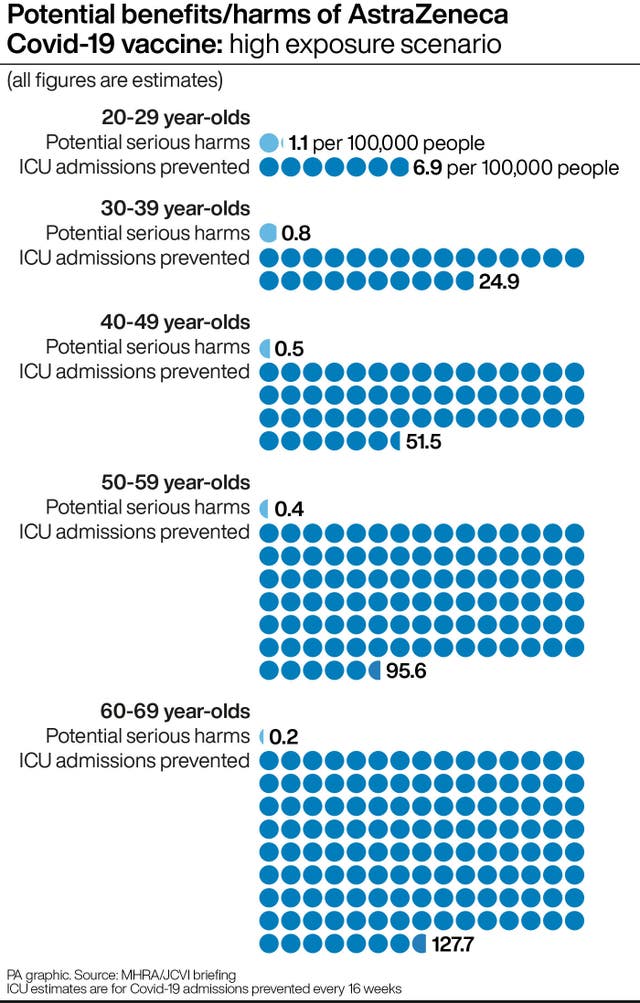Risk of blood clots from Covid-19 ‘much higher’ than from vaccine, experts say
Professor Anthony Harnden, of the JCVI, urged people not to lose confidence in the Oxford/AstraZeneca jab, describing it as ‘a great vaccine’.

Experts have described the risk of getting severe blood clots from Covid as “much higher” than the “extremely small” chance of doing so after having the Oxford/AstraZeneca vaccine.
Figures suggest the risk of developing such a clot is “about four people in a million who receive the vaccine”, the Medicines and Healthcare products Regulatory Agency said on Wednesday.
Up to the end of March, the UK regulator had received 79 reports of blood clots accompanied by low blood platelet count, all in people who had had their first dose of the vaccine, out of around 20 million doses given.
Of these, a total of 19 people have died, although the cause has not been established in every case.
Professor Anthony Harnden, deputy chairman of the Joint Committee on Vaccination and Immunisation, has urged people not to lose confidence in the Oxford/AstraZeneca jab, describing it as “a great vaccine”.
Speaking on Good Morning Britain, Prof Harnden said there is a “much higher risk of getting severe blood clots from Covid than the extremely small risk from this vaccination”.
Chairman of the Commission on Human Medicines Professor Sir Munir Pirmohamed said recent research has shown that clots on the lungs occur in 7.8% of people who have Covid-19, while clots in the legs – known as deep vein thrombosis (DVT) – happen in 11.2% of Covid-19 sufferers.
He told a briefing on Wednesday that almost a quarter (23%) of patients who end up in intensive care with Covid-19 “will have some form of clot”.
He added that up to 30% of people who develop Covid-19 will get thrombocytopenia (lowering of the platelet count).
“That puts into context that the risk of clots and lowered platelets is much higher with Covid-19 than these extremely rare events which are occurring with the vaccine,” he said.

Professor Sir David Spiegelhalter, a statistician from the University of Cambridge, said it is “crucially important” that the risk is set in context, and said the information given this week “shows there is a benefit-risk balance”.
He said the risk of a young person dying in an accident is around one in 100,000 each month.
He told the PA news agency: “It looks like one in 100,000 for someone in their 20s or 30s, that’s about the risk of dying in a road accident in three months, or in some sort of accident in about a month.”
He said the balance of risk can depend on the situation, adding: “Where we are at the moment in the UK with a really quite low amount of virus circulating and alternative vaccines, then what you choose or what you recommend may be rather different from a situation, for example, when the virus is really spreading rapidly through a community and there aren’t alternative vaccines.
“The benefit-risk balance then shifts enormously, so there is no hard and fast rule for any of this”.
He said a “substantial” part of the benefit of being vaccinated is knowing you are helping to protect people around you and “that is unbelievably important”.
On the risk of developing clots from the vaccine, Health Secretary Matt Hancock said there is a similar risk in taking a long-haul flight.
He told BBC Breakfast: “The safety system that we have around this vaccine is so sensitive that it can pick up events that are four in a million – I’m told this is about the equivalent risk of taking a long-haul flight.”
According to the National Institute for Health and Care Excellence (Nice) the annual incidence of DVT is estimated to be about one in 1,000.
But the risk increases after long-haul flights, becoming one event per 106,667 flights which last less than four hours, one in 4,656 flights lasting more than four hours, and one in 1,264 flights lasting more than 16 hours.
While those are the figures for healthy people, the risk can increase further given other factors including obesity and age.
Dr Peter Arlett, head of data analytics at the European Medicines Agency (EMA), said oral contraceptives give a “benchmark” of another medicine given to a healthy population that has rare side-effects.
He said: “If we treat 10,000 women with a combined hormonal contraceptive for a year, we will see four excess blood clots in that year.
“So that just gives a benchmark of another medicine given to a healthy population which causes a side-effect which occurs rarely but that we need to take into consideration.”





